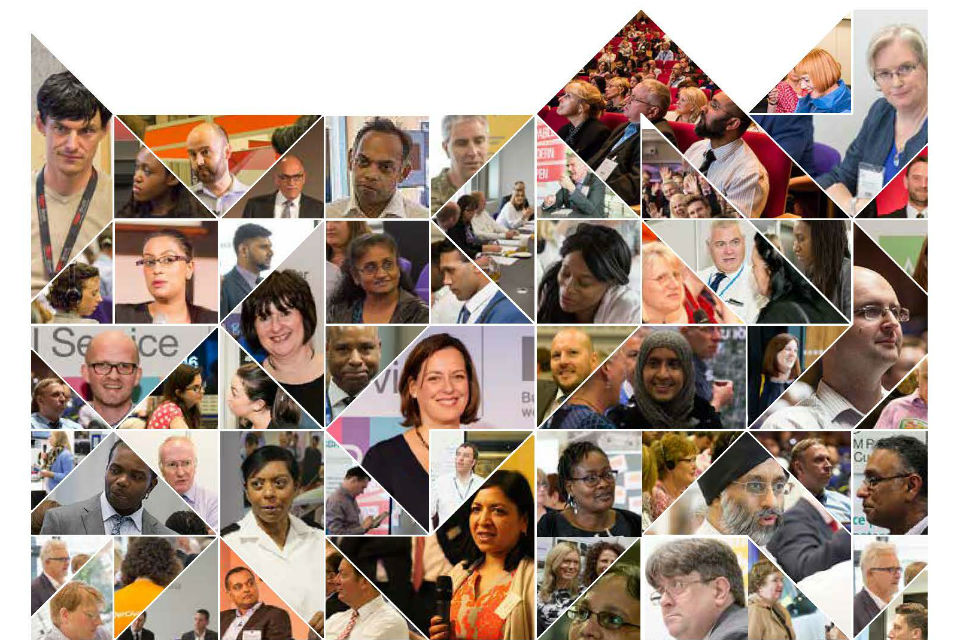
You will have heard more and more about social mobility over the past couple of years. It’s an important priority for the Civil Service, but do you know what you should do differently as a result?
Social mobility is part of the Civil Service Diversity and Inclusion Strategy, the Ministry of Justice’s own Diversity and Inclusion Strategy. It has the strong backing of Jon Thompson, Civil Service Social Mobility Champion, and MoJ Permanent Secretary and Civil Service Race Champion Richard Heaton. It is about giving every one of us the opportunity to realise our full potential, regardless of background or what our parents did.
The benefits of taking this seriously and taking action are two-fold. We will see better business performance, because a diverse set of views will lead to more effective decisions that are reflective of the views of public we serve. And we can all take full advantage of opportunities to develop and progress, and therefore be the best civil servants we can be.

This is something I am personally passionate about. My parents were from one of the big council estates in Bristol. I went to a comprehensive school and we were a one-parent family that spent time on benefits. My friends and I grew up not knowing much about potential career opportunities or apprenticeships, and we gave no thought to professions or ‘climbing the ladder’. We can change that for future generations.
Five things we can do differently
Together we can make a real difference and there are things we can do now, including:
- recognise and nurture potential rather than polish;
- acknowledge unconscious biases that we may have and take action to overcome them;
- reflect a range of backgrounds on sift and interview panels;
- inspire young people from less-privileged backgrounds when you get the opportunity; and
- take the time to help overcome real and perceived barriers that our people may encounter in trying to progress.
Making these small but deliberate steps will make a genuine difference to people’s lives. That’s why I’m proud to be the Social Mobility Champion for MoJ. People with all types of backgrounds are valued because together we bring a range of views to the table based on our life experiences, which leads to more informed decision-making and ultimately better results.
We have just launched our first MoJ Social Mobility Action Plan, which aims to put these steps into practice. It’s an ambitious programme of work that aims to address some tricky issues like data collection, routes into work, attraction, recruitment, selection and progression. We are holding events across the country, with private sector organisations that are leading the way in this field, with charity organisations, and with other government departments. We want to really challenge ourselves on how we will deliver the plan and have an open discussion with staff. We will listen, discuss and share best practice because it’s critical that everyone has a voice and that we make improvements together.
Podcast
I recently recorded a podcast where I was joined by industry colleagues including Tunde Banjoko, the Founder and Chief Executive of ‘Making the Leap’, and Dr Louise Ashley of Royal Holloway, University of London. We talked openly about social mobility: the barriers, the data needed to track progress, the difference it can make, and what best practice looks like. You can listen here.
 I think the Civil Service offers really great career opportunities across the country. The work is interesting and varied, and we make a real difference for the public. It should also be a place where background is no barrier to success. I’m determined that we build on our achievements so far and intensify our efforts in 2018 so we make a demonstrable difference and contribute to making the Civil Service a truly diverse and inclusive workforce.
I think the Civil Service offers really great career opportunities across the country. The work is interesting and varied, and we make a real difference for the public. It should also be a place where background is no barrier to success. I’m determined that we build on our achievements so far and intensify our efforts in 2018 so we make a demonstrable difference and contribute to making the Civil Service a truly diverse and inclusive workforce.

5 comments
Comment by Suleman Patel posted on
Matthew,
This is an important blog on a crucial subject, both for individual departments and the wider civil service, so thank you for your contribution.
Here in HMRC we are currently in the process of setting the wheels in motion on a social mobility network across the department which will look to work alongside the X-gov't mobility network.
You mention in your blog holding events across the country, with private sector organisations that are leading the way in this field, with charity organisations, and with other government departments.
I would be very interested in having a conversation on this with yourself or someone on your team to see if I can learn from you/exchange ideas; and if nothing else we can advance the working with the OGD part of your statement.
Comment by Andy Stokes posted on
Whilst I applaud all the actions highlighted in the article, I agree with Steve on the pay issue. Indeed, it could be agued that the current pay freeze is adversely affecting social mobility, especially for the lowest paid civil servants.
Comment by Sandra posted on
Andy I think you are spot on. Unfortunately I believe that the civil service, in London in particular, is actually exacerbating social inequality and damaging any chanve of social mobility. It is such a shame that future generations will not have the opportunity that I have had. The erosion of civil service pay, lack of progression resulting in the lack of living wage and the cost of housing is making it impossible for the new generations of civil servants to remain in post. The only ones that can afford to stay will be those in relationships where one partner earns a good wage or you have a trust fund. This is very sad indeed. I have had a great time in the civil service, met some amazing and talented individuals, but I am relieved that I am counting the days down to retirement rather than just joining. Buying a propert in London is impossible, and renting is expensive and unpredictable. When police personnel cant afford their rent and are evicted it paints a rather disheartening picture. So I am afraid we need more than just these 5 pledges.
Comment by Steve Nyilasi posted on
recognise and nurture potential rather than polish I have do idea what this means and surely the most positive way to Support Social Mobility would be to offer a fare living wage to at least stay up with inflation
Comment by Erica posted on
If we all did the:
"Five things we can do differently......
•recognise and nurture potential rather than polish;
•acknowledge unconscious biases that we may have and take action to overcome them;
•reflect a range of backgrounds on sift and interview panels;
•inspire young people from less-privileged backgrounds when you get the opportunity; and
•take the time to help overcome real and perceived barriers that our people may encounter in trying to progress."
The Civil Service would truely be a remarkable place to work.